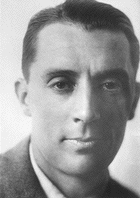- Frédéric Joliot-Curie
Infobox_Scientist
name = Frédéric Joliot-Curie

image_size = 160px
birth_date =March 19 ,1900
birth_place =Paris ,France
death_date = death date and age|1958|9|14|1900|3|19|df=y
death_place =Paris ,France
nationality =France
field =Physics
work_places =Sorbonne ,Collège de France , France's National Center for Scientific Research
alma_mater = School of Chemistry and Physics of the city of Paris
doctoral_advisor =
doctoral_students =
known_for =Atomic nuclei
prizes =Nobel Prize for Chemistry (1935)Jean Frédéric Joliot-Curie born Joliot (
March 19 ,1900 –August 14 ,1958 ) was a Frenchphysicist andNobel laureate .Biography
Early years
Born in
Paris ,France , he was a graduate of the School of Chemistry and Physics of the city of Paris. In 1925 he became an assistant to Marie Curie, at the Radium Institute. He fell in love with Irène Curie, and soon after their marriage in 1926 they both changed their surnames to Joliot-Curie. At the insistence of Marie, obtained a secondbaccalauréat , a bachelor's degree, and a doctorate in science, doing his thesis on the electrochemistry of radio-elements.Career
While a lecturer at the Paris Faculty of Science, he collaborated with his wife on research on the structure of the
atom , in particular on the projection of nuclei, which was an essential step in the discovery of theneutron . In 1935 they were awarded theNobel Prize in Chemistry .In 1937 he left the Radium Institute to become a professor at the
Collège de France working on chain reactions and the requirements for the successful construction of anuclear reactor that uses controllednuclear fission to generate energy through the use ofuranium andheavy water . Joliot-Curie was one of the scientists mentioned inAlbert Einstein 's letter to President Roosevelt as one of the leading scientists on the course to chain reactions. TheSecond World War would, however, largely stalled Joliot's research, as did his subsequent post-war administrative duties..
Post-war
After the Liberation, he served as director of the French National Center for Scientific Research and became France's first High Commissioner for Atomic Energy. In 1948 he oversaw the construction of the first French atomic reactor. A devout
Communist , he was relieved of his duties in 1950 for political reasons. Joliot-Curie was also one of the eleven signatories to theRussell-Einstein Manifesto in 1955. Although he retained his professorship at theCollège de France , on the death of his wife in 1956, he took over her position as Chair of Nuclear Physics at the Sorbonne.Joliot-Curie was a member of the
French Academy of Sciences and of the Academy of Medicine and named a Commander of the Legion of Honour, He was awarded theStalin Peace Prize in 1951 for his work as president of theWorld Council of Peace .Personal life
Frédéric and Irène hyphenated their surnames to Joliot-Curie after they married 1926. Eleven months later, their daughter Hélène, was born, who would also become a noted physicist. Their son, Pierre, a biologist, was born in 1932. He devoted the last years of his life to the creation of a centre for
nuclear physics atOrsay , which is where his children were educated.Legacy
The Joliot crater on the
Moon was named after him posthumously.External links
* [http://alsos.wlu.edu/qsearch.aspx?browse=people/Joliot,+Frederic Annotated bibliography for Frederic Joliot from the Alsos Digital Library for Nuclear Issues]
Wikimedia Foundation. 2010.
